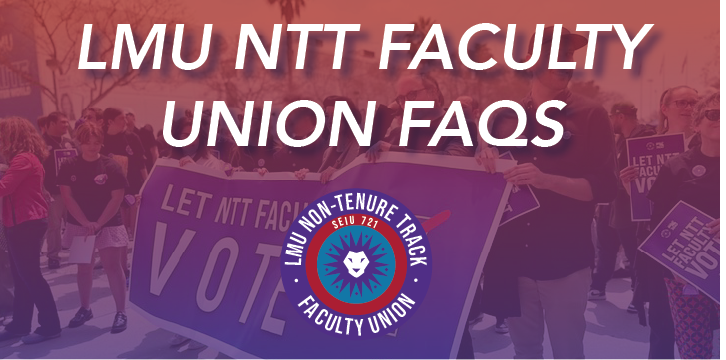
LMU non-tenure-track faculty are coming together to address the crisis in higher education. Non-tenure-track faculty teach the majority of LMU classes, yet we face low levels of compensation, poor benefits, lack of institutional support for research and scholarship, and exclusion from governance. By coming together to form a union, we can raise standards for non-tenure-track faculty and have a real voice in the decisions that affect us and the students we teach.
The Service Employees International Union (SEIU) is the leader in representation of academic non-tenure-track faculty and represents other academic institutions in California. More than 40,000 faculty across the county have organized to SEIU. All non-tenure-track faculty in the California State University system are members of SEIU, through its affiliate the California Faculty Association (CFA).
We embody and control every aspect of our union. As members of SEIU, we ARE the union and are committed to working with faculty across the nation to build a powerful organization, giving faculty a real voice in higher education.
Forming a union enables non-tenure-track faculty to negotiate collectively for better terms of employment, using democratic processes to ensure that the interests of all non-tenure-track faculty are represented. A union contract will establish a floor for what constitutes fair treatment and compensation, not a ceiling. At present, there is a ceiling but no floor.
No one will pay any union dues until we negotiate a contract establishing agreed-upon terms of employment for non-tenure-track faculty. This contract is then ratified by non-tenure-track faculty through a democratic election. Dues are 1.5% of our base pay per pay period and do not apply to bonuses, differentials, or anything on top. There are no initiation fees. No faculty member will pay dues for periods of time that you are not receiving a paycheck from the university.
Yes. Federal law protects your right to organize a union. Under the National Labor Relations Act, you have the right to talk to your fellow faculty in the workplace about your views on unionization, organize with your coworkers to make your collective views known, attend meetings to discuss the benefits of union representation, and to distribute information to your coworkers about the union. It is against the law for an employer to threaten, coerce, or retaliate against you for exercising these legal rights in the workplace.
It is your legally protected right to join with your coworkers to organize for union representation. If you have been threatened or intimidated for exercising your rights in the workplace, please contact Kevin Reyes 213-308-1655 or kevin.reyes@seiu721.org
Yes, you are allowed to talk to union organizers during regular work hours to the same extent as you can talk to other non-university employees about non-work matters while at work.
Yes, you are allowed to distribute literature to your fellow faculty during regular work hours to the same extent as you can distribute other information to colleagues during this time. However, distribution of literature should not interrupt instruction time.
Yes, you may speak to union organizers on university property to the same extent you are allowed to speak with other individuals who are not associated with the university in areas that are not restricted to university personnel.
Yes, you are allowed to send emails to your fellow faculty using your university email account to the same extent that you can send emails containing non-work information using your university email account. However, these emails should be sent during nonworking time.
We will continue organizing to grow our non-tenure-track faculty union on campus and mobilize with SEIU Local 721 members, LMU students, and community allies to demand for LMU Administrators to recognize our union.
The collective power of a union will make our participation in the Faculty Senate more meaningful.
While participation in the Faculty Senate can work well for addressing academic issues, there are rarely mechanisms for faculty engagement around salaries, benefits, and all other terms of employment.
In the California State University system, the Faculty Senate governs academic issues, while the union negotiates workplace and employment issues. Union members there have successfully used the power of their union to protect faculty voice in academic governance.
While participation in the Faculty Senate can work well for addressing academic issues, there are rarely mechanisms for faculty engagement around salaries, benefits, and all other terms of employment.
In the California State University system, the Faculty Senate governs academic issues, while the union negotiates workplace and employment issues. Union members there have successfully used the power of their union to protect faculty voice in academic governance.
Across the country, faculty who have organized with SEIU have seen significant gains in wages, benefits, job security, and professional development resources.
Faculty at Occidental College, Otis College of Art and Design, Tufts University, Lesley University, Georgetown University, and Fordham University all made significant gains in their first contracts. See the “Union Difference.”
Faculty at Occidental College, Otis College of Art and Design, Tufts University, Lesley University, Georgetown University, and Fordham University all made significant gains in their first contracts. See the “Union Difference.”
This has not happened in any faculty contract negotiated by our union, SEIU. In fact, faculty at Occidental College, Otis College of Art and Design, Tufts University, Lesley University, Georgetown University, and Fordham University all made significant gains in their first contract negotiations.
 Share
Share
 Share
Share